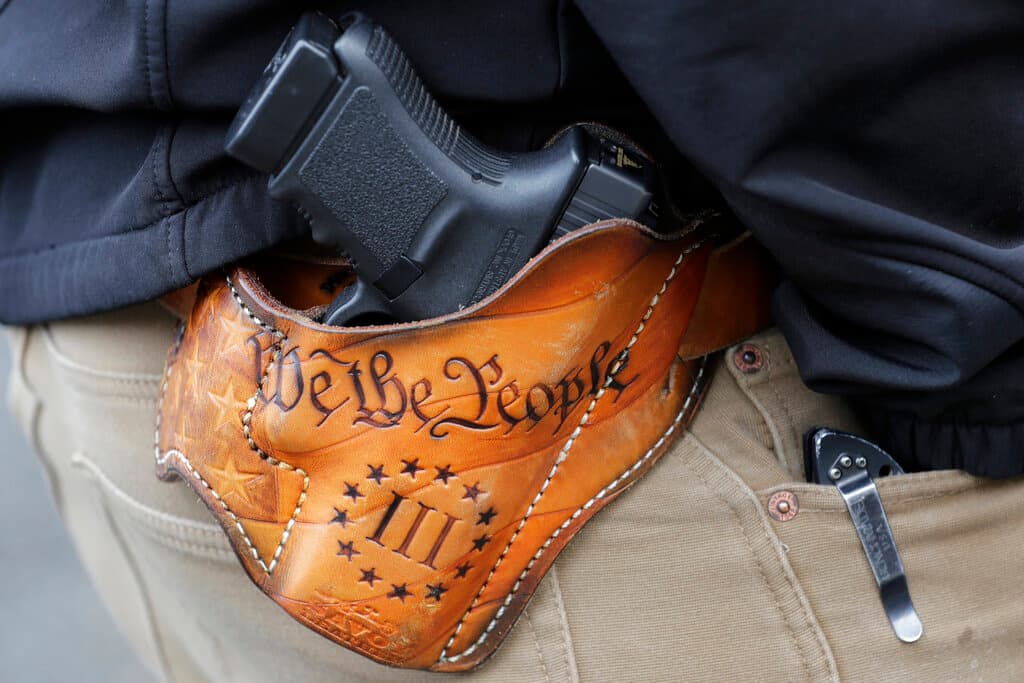Defying Supreme Court, Blue States Aim To Curtail Second Amendment
Lawmakers in Michigan, Colorado, Massachusetts, and Minnesota have filed legislation that would adopt more stringent permit application processes and longer background checks.

A Supreme Court decision this summer threw many blue states’ restrictive gun laws into disarray. Now, Democrats are defying the high court at the state level, looking at new regulations in the coming year.
Lawmakers in Michigan, Colorado, Massachusetts, and Minnesota have filed legislation that would curtail the Second Amendment by adopting more stringent permit application processes and longer background checks. Second Amendment advocates are also eyeing warily so-called red flag laws that would give local governments the power to unilaterally seize firearms.
The proposed state moves follow the landmark Supreme Court decision in June in New York State Pistol & Rifle Association v. Bruen, which found that states must issue permits to those who meet “reasonable” requirements.
Justice Clarence Thomas wrote that states cannot deny applications for arbitrary reasons, such as requirements to demonstrate “proper cause,” and they cannot issue blanket bans of weapons from certain locations.
The decision altered gun restrictions in several states, including New York, New Jersey, California, and Massachusetts. Now, as new state laws make their way through federal courts, Democrats across the country are searching for new methods to restrict the Second Amendment.
In Michigan this year, Governor Whitmer led her party to the first trifecta government — control of all three branches of government — in four decades. Democrats in the state legislature say gun control will be a central issue in the next session.
A state senator who is a longtime gun-control activist, Rosemary Bayer, has said that she sees three areas of potential success: “red flag” laws to allow local governments to take firearms from those who could be deemed dangerous; expanded background checks on all gun purchases; and more restrictive safe storage requirements.
“We believe there are legislative solutions that we can do to make a big impact in reducing gun violence,” the Democratic senate leader, Winnie Brinks, said recently.
The question is whether these measures will have any impact on gun violence.
According to a recent FBI crime report, Detroit is the fourth most dangerous American city for gun crimes, many of which are purchased illegally. Congresswoman Brenda Lawrence, who represents parts of Detroit, says the stringent “safe storage” requirements for firearms could have a real impact, given that children in the city have accidentally shot themselves with their parents’ unsecured weapons.
Colorado, another state with total Democratic control, is less likely to see tighter firearms restrictions. Governor Polis has long had a more libertarian stance on guns, saying that President Biden is wrong for trying to ban assault rifles nationwide.
In the wake of a shooting at a gay club at Colorado Springs this year, Mr. Polis — who is gay — said that gun control is not the only answer to stopping this violence. He said that the state must enforce existing laws, including its red flag law, but also noted that “mental health issues” are a contributing factor that should not be overlooked.
After eight years of being led by a popular Republican governor, Massachusetts will once again be under full Democratic control. Governor-elect Healey, the current state attorney general, will be only the second Democrat in more than 30 years to serve as the Bay State’s chief executive.
Massachusetts has some of the strictest gun regulations in the nation. The Giffords Law Center, a gun control advocacy group, gave Massachusetts an “A” rating for firearms regulation — one of seven states to earn that badge.
Ms. Healey has a history of hostility to lax gun regulations. As attorney general in 2016, she unilaterally reinterpreted the state’s assault weapons ban, issuing a notice to gun manufacturers that “copycat” firearms — those with minimal design changes to weapons that are banned — would not be permitted in the Bay State. She faced pushback from state legislators and Governor Baker at the time, the latter saying her order was rife with “ambiguities” that would infringe on Second Amendment rights.
Democrats in Minnesota also flipped the legislature, giving their party total control of the state. Currently, Minnesota has no requirements for receiving a permit to carry in public — applicants must only complete an application for ownership. The Gifford Law Center has given Minnesota a grade of C, highlighting the relative ease in receiving a weapon compared to other blue states.
Given that, Democrats are likely to aim for stronger restrictions in the coming legislative session. Governor Walz said in an interview this summer that “it is always the right time” to talk about gun control. He has long been a supporter of red flag laws, and said that “even though it wouldn’t stop everyone,” it is a necessary measure to try to prevent gun violence.
With Republicans in control of the U.S. House of Representatives, federal gun control measures are unlikely to advance in Congress for the next two years, at least. Yet as the Supreme Court expands the right to bear arms, conflicts with blue states over the Second Amendment are likely to intensify in 2023.

